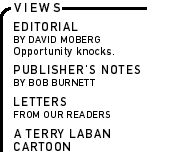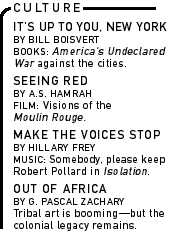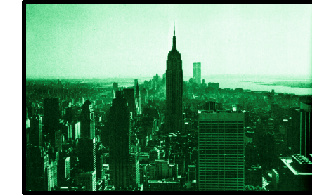

|

|

|

|
|
|
| |
|
|
|
America's Undeclared War: What's Killing No man who owns his house and lot can be a Communist," wrote William J. Levitt, developer of the arch-suburb Levittown. It's a dictum taken very much to heart by Daniel Lazare in his new book America's Undeclared War: What's Killing Our Cities and How We Can Stop It. Lazare is one of the most stimulating writers on the left today, and a fierce partisan of big cities. He is suspicious of the deeply held prejudice that rural life is inherently more authentic than the city and that society must be organically linked to soil and family--a prejudice that lies at the root of the suburban dream of the single-family home set in a verdant lawn. This view is deeply undemocratic, he asserts, and should be stood on its head. Only in dense urban communities, he contends, do people develop the social solidarity and awareness of common interests necessary to formulate collective goals and advance them politically. The General Will is thus organically linked to the city; socialism, the ultimate expression of the General Will, is impossible in a suburban nation. Lazare combines the anthropological bent of urban studies with a penchant for grand
In The Frozen Republic (1996), an attack on the Constitution, Lazare argued that our system of checks and balances, limited government and states' rights put a conservative stranglehold on politics. In America's Undeclared War, he extends this critique to explore the anti-urban dimension of America's conflicts over the Constitution and popular democracy. He traces this history back to the ideological rift between Thomas Jefferson and Alexander Hamilton. Jefferson hated cities and rejoiced from his Monticello retreat when a yellow fever epidemic devastated Philadelphia. Urban masses were the antithesis of his ideal society of self-sufficient yeoman farmers. Hamilton, a dyed-in-the-wool New Yorker, celebrated cities as hothouses for the manufacturing and industry that would carry the nation into a prosperous future. The antagonism between agrarian populism and urban industrialism was bound up in other tensions--constitutional battles between states and the national government, friction between Southern slaveocracy and Yankee capitalism. Lazare argues that these conflicts were a clash between two distinct civilizations--one agrarian, racist, hierarchical, suspicious of progress, dominated by lazy planters with their cringing slaves; the other urban, dynamic, egalitarian and socially fluid, filled with innovative businesses and contentious workers. There's no doubt which side Lazare is on. He revels in descriptions of the idiocy of rural life. "Good country, this, for lazy fellows," he quotes one Kentucky traveler, "they plant corn, turn their pigs into the woods, and ... lounge about the rest of the year." What a contrast to the "restless, enterprising, urban spirit" that "built mills, churches, school-houses, towns and cities ... as if by magic." Colonial Boston was "the loftiest peak" of freedom in America, full of newspapers and pamphlets and sexual transgression ("the 'Whores of Boston' were famous"). When the colonial Governor himself ordered a group of laborers to make way for his carriage, one sturdy workman informed him that "I am as good flesh and blood as you ... you may get out of the way." The Civil War marked "a victory ... for a specifically urban form of democracy" based on "equality and free labor." But even as the urban-industrial order crushed the Slave Power, it faced a resurgent anti-urbanism, this time from the same capitalist interests that had called it into being. As industrial workers poured into the cities, business and government leaders grew nervous at the prospect of a huge, largely immigrant, politically turbulent proletariat encamped in the centers of finance and industry. Paralyzing railroad strikes in 1877 and 1893 underscored the ease with which urban workers might seize the commanding heights of the economy. At the same time, farmers and small-town businessmen unable to compete in the developing nationwide corporate economy scapegoated cities as the nexus of the economic forces that were ruining them. Populists saw the city as a parasite upon the productive countryside; industrialists saw it as a breeding ground for socialism and insurrection; and everyone saw it as a den of political corruption and illicit sex. A modern economy was unimaginable without the industrial city, yet to the anti-urban consensus the industrial city fatally undermined the social order itself. The 20th century suburb, Lazare suggests, defused the crisis by transforming the industrial work force into an approximation of a Jeffersonian yeomanry. If the self-sufficient farmer was obsolete, he could be updated in the form of the suburban homeowner, secure on his plot of land and a stable pillar of the capitalist system. Henry Ford was both architect and apostle of this transformation. He not only mass-produced the cars that dispersed city populations into the countryside, he also articulated a grand social vision of workers tooling back and forth from their suburban cottages to the factory, safely bypassing the crowding, vice and Jewish-Bolshevik subversion rampant in the city (a vision that inspired Adolf Hitler, a Ford admirer, to construct Germany's autobahn system). But the Fordist suburb, Lazare says, could only be realized through massive state intervention. From the New Deal onward, the federal government stacked the deck in favor of suburbanization through a myriad of subsidies for single-family homes, from loan guarantees to mortgage interest and property tax deductions. It also built a vast network of highways and roads to knit together sprawling, low-density subdivisions. Far from a spontaneous outgrowth of the consumer's longing for cars and lawns, suburbanization required government social engineering on an epic scale. This unprecedented mobilization of public resources around an anti-urban agenda dealt the cities--choked with traffic, eviscerated by expressways, their population and tax base hemorrhaging into the suburbs--a fatal blow. Lazare presents this history with style and verve. Unfortunately, he often oversimplifies. He says nothing about the 1863 draft riots in New York, in which dozens of blacks were lynched by whites opposed to the war against the South. How does that fit into his urban-Yankee-vs.-Southern-planter template? This is just one instance of his tendency to romanticize city life, an impulse that distorts the context of anti-urban reform efforts. Although historians are unanimous that the 19th century slum was a very unhealthy place, Lazare speculates perversely that the health of tenement dwellers may have been improved by overcrowding. He is untroubled by urban child labor; young street vendors were "bold adventurers who symbolized all that was free and anarchic. ... Compared to the suburban ennui ... of middle class children in subsequent decades, their existence was in many ways a childhood idyll." He is untroubled by urban prostitution, rhapsodizing the "whores' meaty legs" sprawled across the sidewalks of old New York. He is particularly untroubled by the combination of child labor with prostitution, which, he foresees, somewhat wistfully, in our re-urbanized future: "Perhaps the more enterprising [city kids] would land jobs running errands for the neighborhood bordello ... " he writes, trailing off in a winking ellipsis. While the apocalyptic tone of anti-urban writings (which Lazare insightfully reviews) makes the city a stand-in for all the ills of modernity, not all such misgivings were mere reactionary propaganda. Industrial cities were bad enough to make so staunch a friend of the working class as Engels blanch. Lazare's attack on contemporary suburbia is as jaundiced as his praise of cities is rose-colored. Suburbs are bastions of conformity and consumerism that geographically segregate by race and class; they tie us to cars that pump pollutants and greenhouse gases into the atmosphere and tie us up in traffic all day; they make America uglier with strip malls and parking lots; they make Americans uglier, since driving-instead-of-walking promotes obesity. Suburbia is a welfare state, dependent on hundreds of billions of dollars a year in hidden government subsidies for houses and autos. Suburbia is a "bottomless black hole sucking up energy and wealth," Lazare broods. It "is boring to its depths. One feels the enervation, the deep entropy the moment one sets foot in a subdivision or mall." Far from being a marginal view, Lazare's critique is a familiar one, widely accepted by social critics, architects and disaffected teen-agers. Lazare takes it to a new level of venom which, harping as he does on the artificiality and degeneracy of suburban life, repackages many of the older anti-city screeds. Suburbs make us soft and fat and dependent on handouts; they distance us from our fellow men; they sexually denature us, removing us from the conviviality of the neighborhood bawdy house to the masturbatory confines of the Internet porn site. Worst of all, by transforming the proletariat into politically atomized property holders, suburbs sap the General Will. By grounding society in detached private houses and automobiles, suburbs promote "an extreme form of individualism in which each person [is] encouraged to define his own interests in opposition to those of society around him." Suburbia is "the asocial society." This doesn't quite add up. According to Lazare, when the General Will moved out to the suburbs it lost itself in yard work and PTA meetings. But by any measure, the postwar heyday of suburbanization was an unusually active period for popular democracy and the General Will, which managed to carry through the Great Society, the civil rights movement, the counterculture and feminism. Nor do left-right political divisions correlate neatly with the urban-suburban divide. Canada, for example, a largely suburban nation like the United States, is by comparison a social-democratic paradise. And Detroit, which is really a giant suburb built almost exclusively of single-family houses, was long a bastion of working-class militance. And why exactly did the working classes flock so eagerly to the suburbs? Lazare's polemic is often intemperate and unfair, but the deeper problem is that it is tragically right. The General Will will not be denied, but if anything can be said to express the General Will, it's suburbia. I say this as a New Yorker very much in tune with Lazare. The suburb strikes me as an affront to nature and to common sense, one whose waste of land, building materials and fossil fuels grows more glaring in an era of global warming and resource depletion. As Lazare says, the suburban dream of urban amenities in bucolic surroundings is a dangerous one that will make the planet implode if the rest of the world follows America's lead. But there's no denying the power of this dream to capture the imagination. Yes, it is heavily subsidized (the General Will usually is). But simply ending the gravy train, even if it were politically feasible, would not necessarily do in suburbia. Lazare proposes abolishing subsidies like mortgage interest and property tax deductions. But most taxpayers don't itemize, and so don't even bother taking these deductions--they go mostly to upper class homeowners who can afford their manses without them. Lazare also wants to hike the gas tax. By adding up all auto "externalities," including the costs of noise pollution and sending aircraft carriers to the Persian Gulf, Lazare arrives at a tax of $10 per gallon. But the probable upshot of this would be to give a new lease on life to electric and fuel-cell cars; and anyway, any politician who proposed it would be lynched. Somewhat desperately, Lazare looks to "the working class ... who have suffered the most from de-urbanization" to launch the anti-suburban revolution, but let's be honest: The working class wants SUVs. This is not false consciousness. Americans are aware of the costs of the suburb, even if they're not willing to pay them. We complain about traffic and fret over global warming, but we drive nonetheless. The dysfunctions of suburban family life are staples of popular culture, from American Beauty to The Sopranos. Nor are we immune to the alluring alternatives of city life. The word-association followup to "urban" is no longer "decay," it's "professional." From watching the comely sophisticates on Friends and Sex and the City, we know that the big city is the ideal place to live out the romantic comedy of young adulthood, before we move to the suburbs to raise families. America has not had suburbs foisted upon it against its will. America
likes suburbs, warts and all. But maybe, slowly, the General Will
is drifting back to the big cities. New York's population grew by
650,000 in the '90s, the first substantial growth in many decades.
I hope more come. I remember walking over the Brooklyn Bridge into
Manhattan my first morning in New York. I was swept away by the
city, by its crowds, its stupendous vigor, the thrilling mixture
of intimacy and grandeur in its streets. It seemed, as Lazare says,
the supreme expression of human collective life, and I remember
thinking everyone should live here. Bill Boisvert is an In These Times contributing editor.
|


